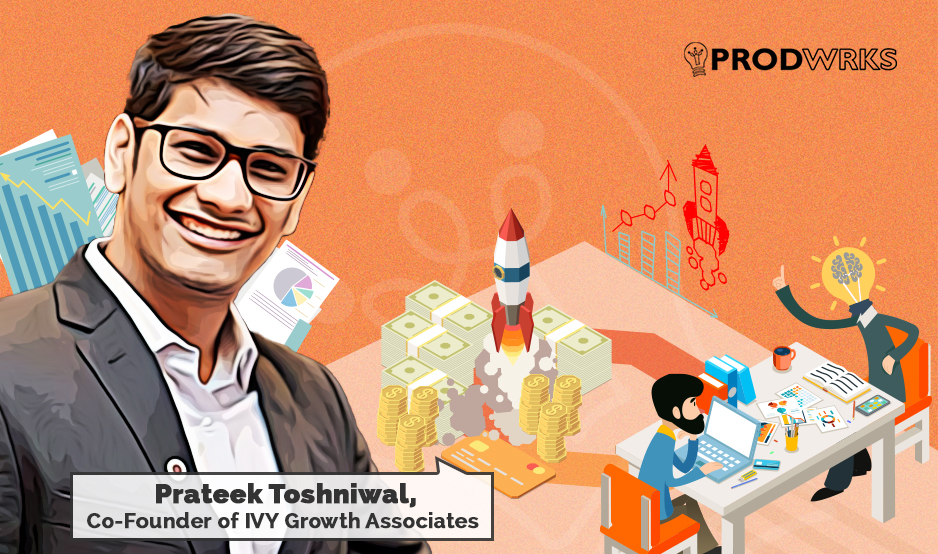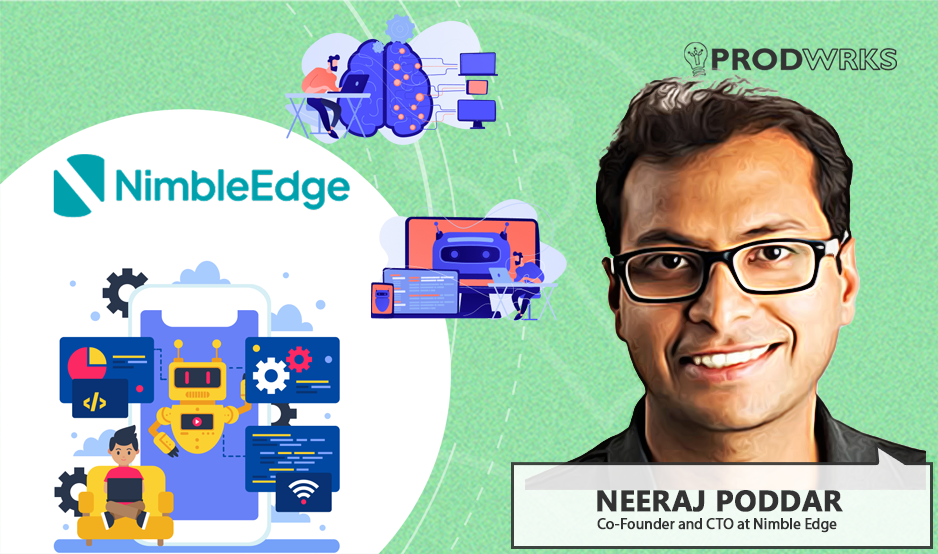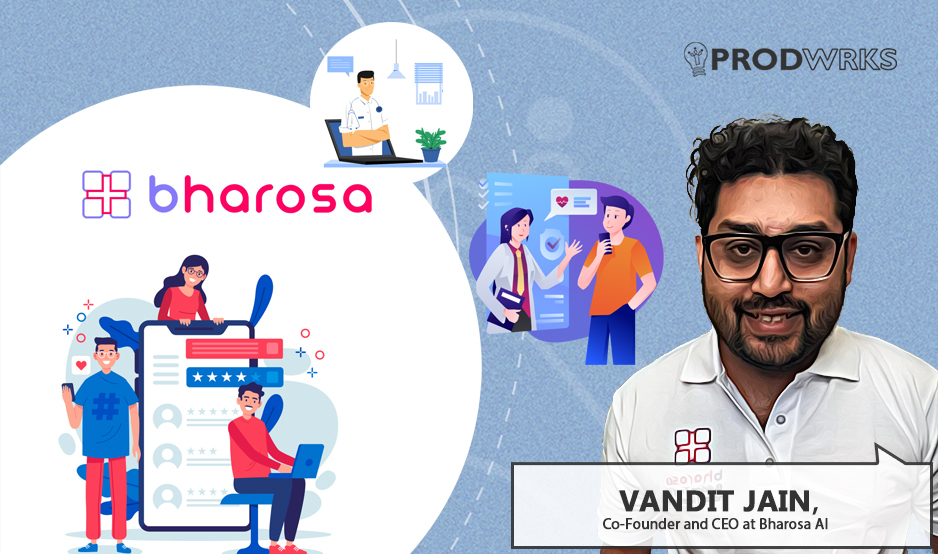
Tech is overvalued. The founder, problem statement, and product come first, says Prateek Tosniwal, Co-Founder of IVY Growth Associates – Surat’s fastest-growing angel network with syndicated investments totalling $10 million in 60+ startups.
With a discerning eye for identifying promising ventures, Prateek’s has invested in 127 startups, including 32 at the personal level, 65 through IVY Growth Associates, and 30 via Nine Spar. His portfolio includes notable names like Vedantu, Cashify, Zypp Electric, ReshnaMandi, etc and three startups Prateek has invested in have been valued at $1 billion or more in recent years.
In an exclusive interview with ProdWrks, Prateek said he is now on a mission to mentor scalable and sustainable enterprises in sectors like edtech, fintech, agritech, healthtech, and EV. He has also launched a $30 million fund based in DIFC Dubai to be deployed in startups across the globe. He aims to increase his sphere of impact to 500+ startups in the next decade, especially in emerging markets like India, Africa, and the Middle East.
Here are Prateek’s insights into the early-stage funding landscape in India and what he is looking for in startups and founders he is willing to bet on.
(This interview has been edited for clarity and length.)
Q. What do you believe are the key factors contributing to a startup successfully securing early-stage funding, and what do you look for in a founding team?
Prateek: In my experience, factors that aid startups in securing successful early-stage funding include a well-established business model, innovation of the idea, the collective strength of the founding team, a well-defined target market, and, more importantly, a compelling pitch. To evaluate a founding team, my team and I usually look for foundational qualities such as their expertise in the domain, adaptability, and ability to execute their vision.
On the other hand, when assessing a startup’s capability, we look for its growth potential, the scalability of its business model, market traction, and its ability to adapt to evolving markets. These metrics allow us to understand their capabilities and help deserving entities scale their growth objectives accordingly.
Q. How can early-stage startups prepare to transition from seed funding to Series A fundraising? Please share insights into successful trends or patterns you've observed in the startups you've invested in.
Prateek: My advice will be to focus more on building a reliable team and a scalable, product-oriented business model. Validating one’s business model and product capabilities through customer acquisition and building plans to retain them also helps startups that plan to transition. Besides these, startups must focus on enhancing their fundraising strategy to ensure they are well-versed in the needs and requirements of potential investors. One key focus area should be building an expansive network, as proper networking can help enterprises connect with like-minded entities and secure substantial funding for their business and causes.
In my experience, the success rate for securing investments in Series A is relatively low. That is why startup owners must work on addressing their shortcomings before they reach out to potential investors. While it is not exactly a trend, a pattern that has been common in the investment landscape is the soaring success rate of those startups that boast diversified revenue streams, a well-connected network of stakeholders, and the ability to leverage technological innovation over others. This development indicates that the new-age business landscape is favouring those adept at scaling their business as per the market demand and can keep up with innovations to maintain their relevance.
Q. From your perspective, what unique strategies are startups employing today to differentiate themselves and attract Series A investors?
Prateek: Interestingly, the new-age startup owners are employing smart means to create a unique proposition for themselves in the market. In fact, the approach to differentiating themselves from contemporaries has been favourable to many startups. One such strategy has to be the increasing inclination towards sustainability. This approach is allowing modern startups to tap into the eco-consciousness of not just the investors but also the consumers.
Similarly, more startups are leveraging tech innovation to enhance their offerings, attracting investors who wish to become early adopters of tech-led transformations. In addition, startups looking to attract Series A investors are also working on increasing their channel of revenue streams to cushion the risk levels. They are also focused on enhancing their data privacy and security methods to safeguard customer interest, making them equally lucrative to tech-savvy investors with a long-term view.
Q. How can startups looking to secure Series A funding effectively showcase their product's traction and market validation to potential investors?
Prateek: We operate in a very competitive world, where every investor is looking for opportunities that are more than a business idea. Today, investors are more inclined towards businesses that have real customers, tangible products, and sustainable growth. In this regard, traction and market validation indicate that a business is capable of attracting customers and generating revenue, which helps lower perceived risks. By showing their growth trajectory, startups can show the scalability of their business model, gaining the confidence of investors seeking reliable and high-growth investment opportunities.
Startup owners can effectively showcase their viability by highlighting the problems their products or services have solved in the target market. This will demonstrate that the product or service actually fits the market. In addition, entrepreneurs must always highlight their key partnerships and collaborations to add credibility to their pitch. That way they can enhance their chances of securing funding and forging meaningful collaborations.
Q. As an investor, what industries or sectors do you find most promising in the current startup landscape?
Q. What are some of the changing trends in the market that you are looking out for?
Prateek: In the upcoming years, we are likely to see a more refined focus on sustainability and tech innovation. Besides these, investment in diverse sectors, such as healthcare, fintech, AI, renewable energy, and EVs, will witness a sharp increase. In such a transforming scenario, the best bet for startups and investors would be to keep up with the evolving trends and accommodate their impact in their strategy to adapt.
Additionally, they must embrace digital tools and explore partnerships to grow their reach and market understanding. Lastly, being the first to learn about evolving market trends and technological innovation will pay off in the long run. So, they must keep up with the changing landscape to remain ahead of the curve. The value of personal learning is invaluable in this regard, so I suggest investors and startups work on their insecurities and lags to excel.
Q. How does your focus on sustainability and solving environmental challenges impact your investment decisions?
Q. Your journey with IVY Growth Associates in Surat has seen significant success with 72 companies and six exits in just three years. What do you attribute this success to, and how do you approach supporting startups within the network?
Prateek: I believe that my transparent approach and industry knowledge have been crucial in helping me achieve success and sustain growth. In addition, I have a very reliable team who supports me in my endeavours and helps me implement my visions effectively. When it comes to supporting deserving startups, be it with resources or capital during their initial stage or guiding them through their growth phase, I am patient in my approach.
I believe that strengthening one’s financial status and market presence takes time, and the role of networking is indispensable in this regard. This is why I make it a point to help startups network with industry players and thought leaders and guide them on how to leverage connections to find new opportunities.
Q. Can you discuss any specific challenges you've faced as an investor and how you've overcome them?
Prateek: The journey of an investor is fraught with multiple challenges, and mine was no different from the rest. In the beginning, I struggled particularly with staying disciplined with my approach in the face of volatility and recognizing my biases. However, my initial years at my father’s Chartered Account firm in Surat strengthened my understanding of investments and risk management. My learnings helped me overcome many challenges that often scare beginners away. Plus, I have always believed that failing is never the opposite of being successful. My experiences and setbacks have been more like a journey toward success. Hence, throughout my career, I made it a point to learn from my experiences and proceed.
One of the most challenging things that I did in recent years was when I shifted my base to the UAE. While the opportunities of marking a global market debut are many, I found myself exposed to intense competition. Looking back, it is safe to say that I adapted, and now I am much more comfortable in my new environment. During the challenging times, one thing that played out for me was my ability to discern what I can and cannot do for my clients. This helped me align my efforts in the right places and offered me room to expand my learnings. As an advisor, I think it has been a valuable lesson and definitely adds to my merit.
Q. With your ambitious goal of impacting 500+ companies over the next decade, what strategies do you have in place to scale your investments while focusing on meaningful impact beyond financial returns?
Prateek: To achieve my goal, I have been diversifying my portfolio across different new and traditional sectors. I am engaging more with entrepreneurs who are focused on making an impact in the community. Since the world is increasingly becoming focused on clean and ethical business practices, I am encouraged to shift my attention towards enterprises driven by ESG goals and compliant with industry norms.
Investors have the power to drive social and environmental changes that impact the greater good of society. As an investor, I believe that by advocating for sustainable businesses and supporting entrepreneurs willing to bring a change in society, we can contribute to a positive transformation in the world we live in. This makes it crucial for both new and seasoned investors to look beyond business fundamentals and focus on enterprises’ sustainable goals and ESG practices before making any decision.



